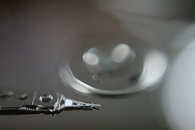Tuesday, February 7th 2012
Heat Key To Faster HDDs...Hundreds of Times Faster
Physicists have discovered a new method of recording data on hard drives that could potentially make mechanical hard drives hundreds of times faster (in terms of performance). Heat holds the key. A hard disk drive is a magnetic storage device, which, unlike magnetic tapes, allows random access. Its recording surfaces consist of hundreds of billions of tiny portions that can be magnetized in a particular polar direction to represent 0s or 1s. To create meaningful arrangements of these portions (bytes), the recording heads apply an external magnetic field to flip their polarities.
A team of researchers led by Thomas Ostler at the University of York, UK concluded that the process of flipping the polarities of these tiny portions can be greatly expedited using short bursts of heat. It has been believed that heat could only assist in remagnetization, when used in conjunction with a magnetic field. Research shows that this can also be achieved using a very, very precise amount of heat generated by beaming a fine laser for less than a trillionth of a second, which momentarily raises its temperature by 800 °C. The results of this study was published here.Researchers say that the new method of magnetic recording can achieve terabytes per second (1000 GB/s) recording/reading speeds. The process also uses less energy than magnetic recording, meaning the new drives would be more energy efficient.
Sources:
New Scientist, Gizmodo
A team of researchers led by Thomas Ostler at the University of York, UK concluded that the process of flipping the polarities of these tiny portions can be greatly expedited using short bursts of heat. It has been believed that heat could only assist in remagnetization, when used in conjunction with a magnetic field. Research shows that this can also be achieved using a very, very precise amount of heat generated by beaming a fine laser for less than a trillionth of a second, which momentarily raises its temperature by 800 °C. The results of this study was published here.Researchers say that the new method of magnetic recording can achieve terabytes per second (1000 GB/s) recording/reading speeds. The process also uses less energy than magnetic recording, meaning the new drives would be more energy efficient.

42 Comments on Heat Key To Faster HDDs...Hundreds of Times Faster
www.techpowerup.com/forums/showthread.php?t=153232&highlight=coercivity
I am a titanium welder. When it gets hot enough, it creates a magnetism so strong, I can bend a 10 gauge filler rod when less than 1mm is in contact. When it cools, it just falls away like nothing happened. I wish I could show a video...
and nothing that i know of proved cooler temps killed drive (except sub ambient) - the only thing i know of proven there, was that normal temps (say, 40-60C) cause no problems. if drives were gunna fail, they just fail. temps only speed it up (and this was posted by google buying and using entire batches of drives)
800C sounds a tad bit dangerous (not to mention power consuming) for consumer hardware though. If that's the temp of the laser and it only brings, say, 3 atoms thick of platter up to maybe 200C--it wouldn't take long at all for that to cool back down to ambient (milliseconds likely).
Those things used laser to heat up the recording area and store data magnetically. The difference seems to be in the way data is read out.
35-40C is optimal temperature for disk life of 3 or less years, however if it won't fail in the third year it will likely last to at least five.
Oven would melt it. Me thinks microwave would have better results. Me thinks xD.